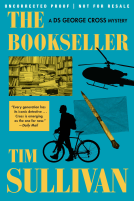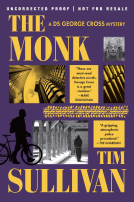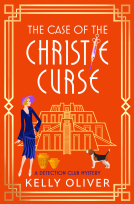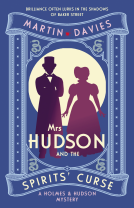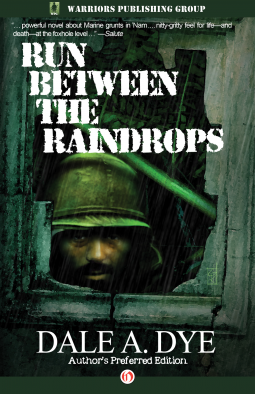
Run Between the Raindrops
Author's Preferred Edition
by Dale A. Dye
This title was previously available on NetGalley and is now archived.
Send NetGalley books directly to your Kindle or Kindle app
1
To read on a Kindle or Kindle app, please add kindle@netgalley.com as an approved email address to receive files in your Amazon account. Click here for step-by-step instructions.
2
Also find your Kindle email address within your Amazon account, and enter it here.
Pub Date Feb 03 2015 | Archive Date May 03 2015
Open Road Integrated Media | Warriors Publishing Group
Description
A Note From the Publisher
Advance Praise
“. . . powerful novel about Marine grunts in ’Nam. . . . nitty-gritty feel for life—and death—at the foxhole level . . .” —Salute
“Run Between the Raindrops
will live on as one man’s epitaph to a generation because it captures
so well the pathos, the very personal struggles and conflicts that
characterized the lives of thousands of people who left The World to
fight a war . . .” —Soldier of Fortune
Available Editions
| EDITION | Ebook |
| ISBN | 9781453292815 |
| PRICE | $9.99 (USD) |
Average rating from 3 members
Featured Reviews
 Lee M, Librarian
Lee M, Librarian
Loved it, brilliant book by Dale A.Dye who is Vietnam veteran, actor, writer, presenter and businessman.
The book was actually published in 1985 but has now been revised by the author. Dale A. Dye was a photojournalist but during a particularly hard battle around the retaking of the Imperial City in Hue' City during the Tet offensive in 1968, he grabbed a weapon and became a squad leader.
Highly recommended.
 Hera S, Reviewer
Hera S, Reviewer
I glance at his helmet. He's drawn a detailed depiction of the Marine Corps eagle, globe, and anchor emblem on the camouflage cover and modified the Semper Fidelis motto to Simply Forget Us
This is a grueling, disorienting, completely engrossing read about the experiences of a Marine journalist who was assigned to get to know his fellow grunts so he could send back articles and photos to their hometowns.
There's a contrast between the cynicism and bitterness and confusion in the novel, and the self-reflection and perspective in the author's note, which was written twenty-odd years after the book was originally written. If you pick this one up, I suggest getting the newest release, and definitely read what Mr Dye has to say before you read the book.
I wanted to write something different with trappings and observations on the gonzo model of first person, experiential screeds that would convey the surreal, often hallucinatory images I recalled from fighting in the mean streets of Hue.
This book is surreal to the point it's frightening. I've never read a book before that gave me chills the way this one did. I've never read any account of war that made me think I understood even a little of what that hell is like. Until I read this book. It's so painful and bleak and frightening and sickening to read that I had to take breaks. And then I inevitably thought about how I was taking a break from just reading about a battle, and I thought about how my beloved uncle lived it day in and day out as a soldier, then came home and relived it every day until he died. I wanted to understand the things that haunted him a little better, and I think I finally have an inkling now.
One thing I noticed is that if you stripped out the references to outdated machinery and location, you could still spot a Vietnam-era novel like this one in a lineup with Iraqi War novels. The soldiers in Vietnam were angrier, were frequently abusing drugs or alcohol, they used prostitutes as openly as they used C-rations, and they referred to the enemy almost exclusively by racist epithets. (Be warned if you read this: racism. All over. Everywhere. Every page.) Vietnam-era soldiers talked about the ways the government lied to them and to the media, with no patriotism at all to temper it. And they talked about the lies they told in return, like about looting the homes and shops of the people they were ostensibly there to liberate.
In an Iraq War novel, there are still disturbing behaviors, of course there are...but the overall tone is different. The enemy in a modern war story is an "insurgent" and there's a strong effort to state that an insurgent is not the same as the vast majority of the people in the region. There's still alcohol use, but it's not referenced as a daily thing that you smuggle into your water canteens. I'm certain there's drug use because God knows my cousins who served over there have said there is, but in the novels it's not painted as part of the accepted culture.
Maybe a part of that is that modern men and women all freely choose to enter the military. In the 60's, if you were male you could be picked against your will. And then you could try to get the money to run away and still ultimately risk prison time, or you could go to Vietnam. What choices!
This novel talks about the battle for a citadel. It was not a strategically important structure, but the Marines were not allowed to damage it. It had an NVA (North Vietnam) flag flying, and so the higher ups ordered the Marines to storm it. The integrity of the building was considered more important than the lives of the men on either side, because damaging the citadel would make them (more) unpopular.
Imagine going to your death knowing it was all for the enemy's flag. Literally.
Who knows what stories about the Iraq/Afghanistan wars will come out with time. It took decades for some of the Vietnam stories to be told. I only hope that they will reflect that we have learned something from the mistakes made in past wars, especially Vietnam. As far as war novels go, I consider this to be one of the most important I've ever read.
Readers who liked this book also liked:
Kelly Oliver
General Fiction (Adult), Historical Fiction, Mystery & Thrillers
